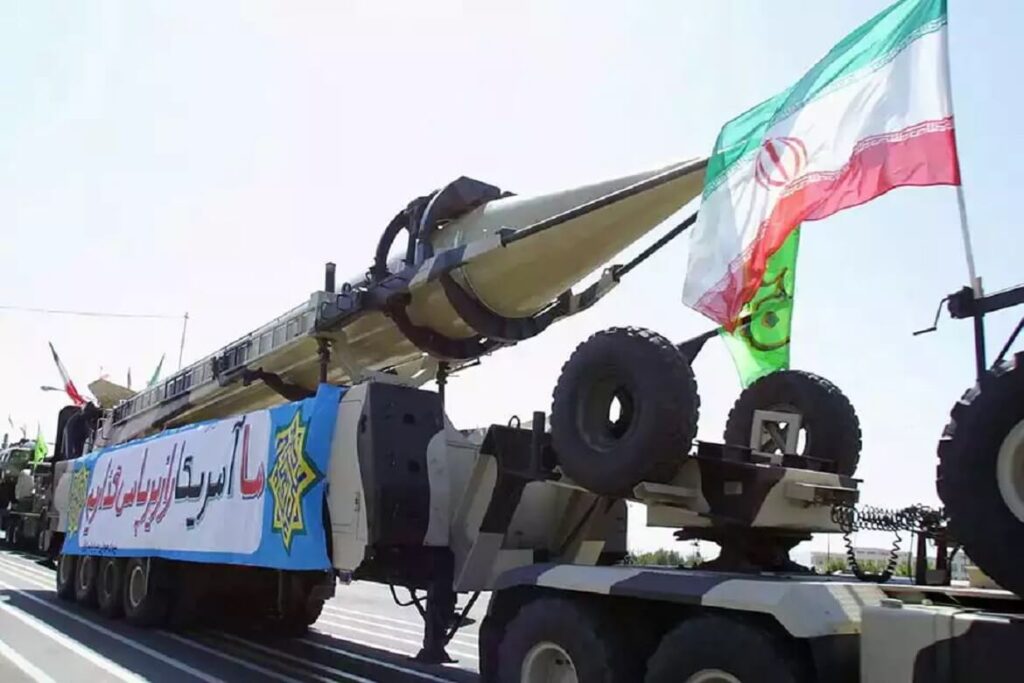World Geostrategic Insights interview with Hazem Salem Al Dmour on the expected Iranian attack on Israel, the actors involved, Israel’s likely response, and other relevant current circumstances.

Hazem Salem Al Dmour is a Specialized Researcher in International Relations and Strategic Studies, General Manager at the Amman-based Think Tank STRATEGIECS – ستراتيجيكس
Q1 – The upcoming Iranian attack on Israel is expected to be the second direct attack Iran has launched against Israel. How long can we expect this escalation to last?
A1 – The continuation of the escalation is a decision made by the far-right Israeli government, supported by the United States and some European countries. As long as the government led by Israeli Prime Minister Benjamin Netanyahu is in power, and unless the U.S. administration takes a firm stance to stop the escalation, it will likely continue at least until after the U.S. elections. The position of the newly elected U.S. administration, whether Democratic or Republican, will play the most significant role in Israel’s decision to either immediately halt or continue the escalation in different forms.
The possibility of a temporary de-escalation or state of relative calm are tied to reaching agreements on a ceasefire in Gaza that include the release of the Israeli detainees held there. This could later evolve into a permanent ceasefire if internal Israeli pressure (from the political opposition and/or public protests) succeeds in influencing the far-right government, and if the current U.S. administration increases its pressure on Israel at the last moment. This scenario is possible given the ongoing negotiations in Egypt, which have led to agreements between Fatah and Hamas on a future mechanism for managing the Gaza Strip. If these efforts succeed in Gaza, it would be easier to later replicate them in Lebanon.
Q2 – Is it expected that Jordan and Saudi Arabia will help Israel against the upcoming attack? If yes, how?
A1 – It is in the interest of both Jordan and Saudi Arabia to avoid dragging the region into the abyss of an all-out regional war. The sovereignty of both countries should be respected, including their land, sea, and air territories. In the event that Iran violates either nation’s sovereignty under the pretext of attacking Israel, it is the duty of both nations to respond to such violations by all possible means—directly, through the use of air defense systems, or indirectly, through cooperation with regional and international defense systems and allies.
Q3 – How strong is the expected Iranian attack? What level of offensive capability can the Iranians display without provoking a larger Israeli response.
A3 – It is too early to judge the strength of the attack before it takes place; however, some insights can be drawn by looking at the displays of Iran’s offensive capabilities in the April 14 and early October attacks. In the first, Tehran aimed to showcase various elements of its power and tools, launching nearly 300 projectiles, including drones, ballistic missiles, and cruise missiles, in a complex attack. In the second, Iran fired around 180 Fateh-type ballistic missiles, targeting military and intelligence bases, and causing damage to Nevatim Airbasein southern Israel.
This demonstrated Iran’s significant ability to deliver a direct strike that went undetected by the U.S. and Israel until just hours before it was launched. The missiles reached Israeli airspace in a record time of about 15 minutes, and there were difficulties with both U.S. and Israeli air defense systems in intercepting these missiles, allowing many of them to hit their intended targets. Israeli officials acknowledge that if the missiles had been equipped with high-explosive warheads, they could have caused catastrophic damage to military bases.
This gives an indication of Iran’s capabilities in using force and its potential impact, but it also comes with the risk of provoking a reaction from Israel. Otherwise, Iran is likely to continue focusing on showcasing its power rather than causing significant damage to Israel.
Q4 – Can the upcoming Iranian offensive be limited to its proxies? How much of the attack should come from Iran, and how much from its proxies?
A4 – Generally speaking, there are three potential Iranian response paths.
– Direct Response: This could involve the use of drones or ballistic missiles, either with the same intensity as the previous response, less, or more severe.
– Indirect Response: This would involve Iran’s regional proxies in Lebanon, Yemen, and Iraq potentially carrying out a targeted response such as an assassination or attacking sensitive sites.
– No Response.
The most likely path so far is the indirect response, given the nature of the recent Israeli response, Iran’s official stance on it, its downplaying of the scale and impact of the Israeli action, the near balance that was achieved afterward due to the strength of Iran’s previous response, and Iran’s regional and international calculations. Iran is keen to avoid an escalation that could lead to strikes on its nuclear and oil sites followed by the regional war that Israel seeks. All of this makes a direct response unlikely and turns any threat of such a response into a tool for media warfare and political messaging.
Furthermore, a complete lack of response, especially in the absence of ceasefire agreements in Gaza and Lebanon, does not serve Iran and its axis’s interests. Therefore, the second path seems more likely, though the other paths remain possible depending on changing circumstances.
The nature of the indirect response in the second path is not necessarily immediate, and it may occur without prior warnings or indications. Iran would not take direct responsibility for such actions.
Q5 – Do you think Israel could launch a preemptive strike against Iran and neutralize the threats before they become active?
A5 – This possibility remains plausible, considering Israel’s intelligence and informational superiority, as demonstrated by its precise strikes against Hezbollah and the assassination of Ismail Haniyeh in Tehran. However, the Iranian attack in early October showed a significant ability on Tehran’s part to maintain an element of surprise, directing its strikes without being detected or giving prior warning.
Launching preemptive strikes against Iran is a complex matter, requiring operational readiness and extensive logistical support. Given Israel’s involvement in two wars and multiple escalating fronts, it is more likely that Israel would prefer to enhance its defensive capabilities in cooperation with the United States, while maintaining offensive capabilities to deter any unexpected Iranian attack.
Q6 – What kind of response can or should Israel have if attacked?
A6 – This depends on the nature and scale of the expected Iranian attack, whether it is direct or carried out through proxies. However, both Israel and Iran have shown considerable restraint in order to avoid being drawn into a wider confrontation that could result in significant losses. The response may remain within the framework of limited strikes and counter-strikes, essentially as a display of capabilities and a way to demonstrate available tools.
It is worth noting that with the United States entering a transitional period of governance from November 2024 to January 2025, Washington and its allies will likely face limitations in their ability to shape foreign policies and strategic directions during this time.
Q7 – Final insights? You are the experts, so feel free to elaborate on what you think is relevant but hasn’t yet been addressed.
Protecting Jordan’s national interests, as well as the collective Arab interests, requires the kingdom to actively help prevent the situation from escalating into a regional war. The ways to achieve this are multiple and complex, with the key steps including intensifying and unifying pressure for ending the war in Gaza and Lebanon, moving forward with regional and international agreements to officially adopt the two-state solution, strengthening resistance to settlement activities in the West Bank, intensifying security measures to counter any Iranian attempts to destabilize Jordan’s internal security, strengthening security and military measures on the western borders and borders with Syria and Iraq, and enhancing the relations of the Arab Quartet—Jordan, Egypt, Saudi Arabia, and the United Arab Emirate—and advancing all four to a higher level of political and security cooperation and coordination.
What must be taken into account is that Donald Trump’s victory in the U.S. presidential election significantly changed Iran’s calculations, particularly regarding Trump’s support for unequal strikes to halt cycles of escalation. For example, he approved the assassination of Qasem Soleimani and Abu Mahdi al-Muhandis in January 2020, following a period of heightened tensions between Iraqi armed factions and U.S. forces. Trump also urged Israel to target Iran’s nuclear reactors as a response to Iran’s early October attack.
Therefore, any Iranian attack, even if an attack of low intensity and scale, could provoke a significant Israeli and U.S. response.
Hazem Salem Al Dmour – General Manager at the Amman-based Think Tank STRATEGIECS – ستراتيجيكس.
Image Source: AP







